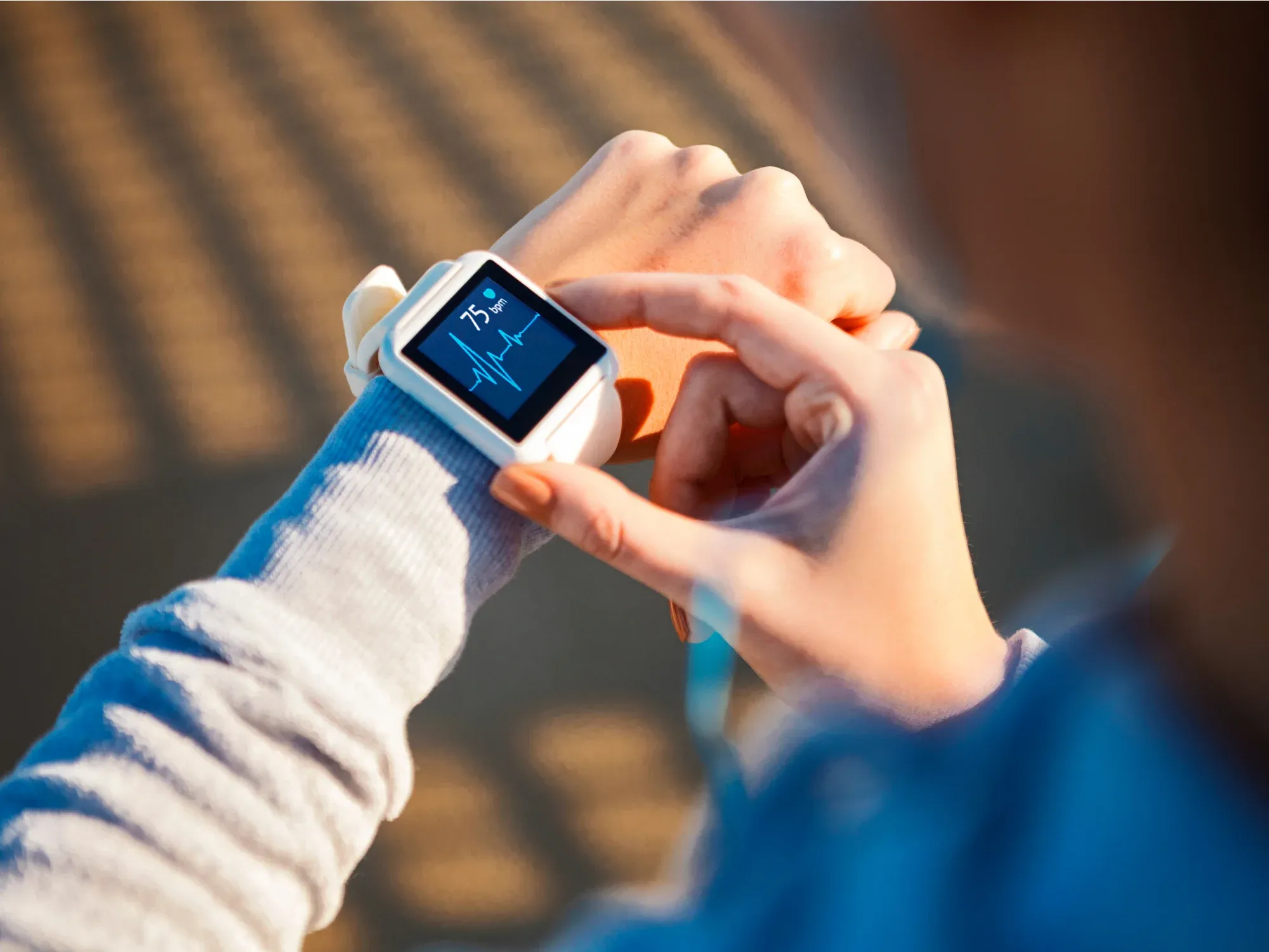Services
SERVICES
SOLUTIONS
TECHNOLOGIES
Industries
Insights
TRENDING TOPICS
INDUSTRY-RELATED TOPICS
OUR EXPERTS

July 29, 2025
AI is transforming every aspect of sports, from the competition and game play to the show and entertainment business. AI-powered tools are already being used in virtually all major sports disciplines, such as American football, soccer, baseball, and cricket, as well as non-professional leisure activities like grassroots sports.
Scheme title: AI in sports: main fields of application
Data source: pwc.com.au —
Artificial Intelligence. Application to the Sports Industry
Artificial intelligence can influence the relationship between athletes and sports companies right from the start. Specifically, AI-powered predictive modeling is used to analyze players’ performance data (speed, agility, technique, playing style, etc.) and assess their athletic potential and market value before a sports club decides to invest in them.
The adoption of tools powered with artificial intelligence can benefit players as well because they reduce any bias during recruitment. Furthermore, AI software can analyze game footage from anywhere in the world, increasing the chances of athletes getting noticed even if they live in remote locations or where certain sports aren’t very popular.
AI-based performance analysis software provides coaches with valuable insights to develop effective game strategies. AI systems can analyze information gathered via wearable sensors and cameras, including passes, goals scored, rebounds, player’s movement speed, and ball trajectories, to help identify opponents' playing patterns and adjust game plans accordingly. Coaches can even use AI software to run simulations of potential in-game scenarios, test tactical adjustments, and make more informed decisions during matches.
At the same time, AI helps coaches to shed light on their athletes’ strengths and weaknesses and thus create more personalized training programs for performance optimization.
Combined with health wearables, AI-driven systems can monitor biometrics and biomechanics parameters, such as heart rate or muscle loading, to assess a player’s physical condition, spot potential injuries or health problems at an early stage, and thus help physicians select suitable therapies for faster recovery.
These solutions also provide coaches with data-driven insights to develop more balanced training plans, adjusting the intensity and duration of each activity to avoid harmful overtraining and minimize the risk of injury.
Video assistant referee systems (VAR) and similar video-review or instant-replay systems have been used in various sports for years to provide slow-motion highlights to human referees, but they often slowed down the game, creating frustration among fans and players. AI-based computer vision technology, on the other hand, can detect game violations, such as handball offenses in football, way faster and more accurately than traditional systems, minimizing game flow disruptions.
Artificial intelligence looks set to influence sports storytelling. Using machine learning and deep learning algorithms, broadcasters can automate numerous video editing operations, including camera shooting and zooming in on key field actions. Fully automated sports production is already almost comparable to professionally edited videos.
Thanks to recent innovations in the field of natural language processing (NLP) and generative AI, automation is also finding its way into sports journalism, enabling the press to create brief news reports for hundreds of matches and cover many more events with fewer resources. Furthermore, media companies can use conversational AI systems to retrieve game footage and other content from large databases through simple queries in natural language. The NFL implemented a similar solution to search for media assets in its vast library of athlete press interviews, fan-generated social media content, and many other resources.
During sporting events, sports companies can use AI software to provide fans with real-time subtitles in different languages based on their nationality or additional stats and deeper insights to enrich their experience. AI can also be combined with augmented reality to display AI-generated tactical breakdowns via image overlays, or with virtual reality to integrate such insights into 3D environments.
Furthermore, artificial intelligence enables clubs and sports event management companies to offer better customer support via chatbots and other smart assistants. These tools have already been adopted by many sports teams and leagues, such as the NHL and NBA, to address fan questions regarding tickets, parking, and other organizational issues.
Offering a great fan experience with artificial intelligence is significantly reshaping sports advertising and, as a result, maximizes advertising commissions. ML-powered marketing solutions analyze viewer preferences, such as demographics, media consumption patterns, and shopping behavior, to segment audiences and deliver personalized, relevant ads instead of generic ones.
Additionally, AI solutions powered by machine learning algorithms can identify the most exciting in-game actions based on fans' emotional response, enabling broadcast companies to better time commercials and capture the attention of their audience for maximum engagement. This makes ads not only more personal but also better timed and more effective.
Sports betting operators have long shown interest in the predictive analytics capabilities of machine learning systems. So much so that high-tech companies like Sportlogiq have started selling analytical data to bookmakers in the United States, helping them set odds on bets.
However, reliable forecasts would require massive amounts of information, including historical data on individual and team performance, locations, scores, weather conditions, and so on. Many of such details are not public but lie in the hands of sports clubs, so the increasing use of AI in betting leads to an intensification of data trading between different sports-related organizations.
| The global AI in sports market was valued at $1.2 billion in 2024 and is projected to hit $4.7 billion in 2034, growing at a CAGR of 14.7% between 2025 and 2034. Machine learning was the leading tech segment with a market share of 41% in 2024 | |
|---|---|
| The five tech companies leading the AI in sports industry in 2024 were IBM, SAS, SAP, Catapult, and Sportradar AG, with a combined market share of 24% | |
| The global sports analytics market was valued at $4.47 billion in 2024 and is expected to grow at a CAGR of 20.6% from 2025 to 2030, with AI and ML integration fueling this positive trend |
| 50% of global sports fans are optimistic about the impact of AI on sports. This share rises to 58% among 18-29 year olds | |
|---|---|
| According to fans surveyed globally, AI and other technologies will positively impact the advancement of sports in areas such as training (mentioned by 70% of them), sports medicine (70%), game strategy (70%), coaching (67%), injury prevention (65%), talent acquisition (62%), and fan engagement (58%) | |
| Sports fans consider real-time updates the top priority to improve engagement with GenAI (selected by 34% of them), followed by personalized content (29%), unique insights (28%), and meaningful predictions (26%) |
Scheme title: GenAI impact across sports use cases and organizations
Data source: PwC
| High upfront costs, infrastructure gaps, poor data quality, and unclear business value can negatively impact the long-term profitability of AI adoption in media, entertainment, and sports, and increase the AI project failure rate, currently estimated between 30% to 80% | |
|---|---|
| Key barriers to GenAI adoption in sports include the need to change previous ways of working (mentioned by 19% of respondents), lack of clarity on potential use cases (17%), and insufficient funding to support GenAI development (14%) |
Powered by artificial intelligence, The NBA Global Scout mobile app serves a dual purpose. First, it can analyze videos uploaded by users, helping them to self-assess their skills (including wingspan, vertical leap, and shooting ability) while performing specific exercises and to identify areas of improvement. Secondly, the training platform enables players around the globe to showcase their talent and potentially get drafted into the NBA, thus complementing resource-intensive recruiting campaigns.

Some of the football teams in the English Premier League have started using GPS vests by Catapult to monitor athletes during training and matches. These smart wearables can measure several metrics, such as distance, sprints, and speed, to help coaches optimize player workload and selection while preventing overtraining and minimizing the risk of injuries. The related AI-powered application can also track athletes via heatmaps to assess whether their play aligns with the team's tactical objectives.

Deployed both in Wimbledon and the US Open, IBM's advanced data analytics solutions leverage AI to rank players' momentum and predict results based on explainable win factors. These include previous win-loss ratio and win margin, rank differential, court surface, and injury status, complemented with fan sentiment collected from social media through natural language processing software. The same NLP technology is then used to self-generate fact sheets and share such insights with the fan base.

During the Artistic Gymnastics World Championships, the IFG adopted a deep learning-based system developed by Fujitsu which can track athletes' movements thanks to multiple laser sensors and computer vision technology. The solution visualizes gymnasts’ performance via 3D models and extracts key scoring data, enhancing judges' decision-making. To further improve its accuracy, the system was "trained" with digital scans of each athlete before the competition.

Given the complex architectures of sports-oriented AI solutions and their reliance on data, organizations implementing this technology can face a number of adoption challenges.
Challenge | Solution | |
|---|---|---|
Integrating data from multiple sources |
Most AI solutions for sports comprise multiple components, including different IoT sensors (cameras,
wearables, etc.) to collect visual and physiological data and an analytics system to process such
information. All these elements can rely on different communication protocols and technologies to exchange data and typically handle various data types and formats (including ongoing data streams collected in real-time). If such components don't interact efficiently, the resulting analyses will be inaccurate. | Communication between IoT devices and the data analysis platform can be enabled through application programming interfaces (APIs). You can leverage cloud platforms, such as Amazon API Gateway, Cloud Data Fusion API, or Azure API Management, to facilitate this process. To convert multiple communication protocols, however, you may need to use data virtualization techniques or create a middleware architecture, such as an ESB. Furthermore, you should integrate heterogeneous data from different sources via ETL pipelines (consider using AWS Glue, Azure Data Factory, or other cloud data integration tools) and consolidate it into data storage acting as a single source of truth. In this regard, you can opt for time-series databases due to their ability to handle data streams, or NoSQL databases and data lakes for their flexibility. |
Addressing AI model overfitting |
During the AI model training process, AI algorithms process large sets of sports-related data to identify
patterns and relationships across data points. A common issue you can face, however, is so-called
overfitting, or when an AI model performs well with training data but struggles to generalize to different
game scenarios or new players.
| Avoiding overfitting and ensuring model robustness is crucial for effective sports applications. First, you should train the solution on large and diverse data sets. For example, training data should include data points collected from different matches, teams, tournaments, etc. To assess how the model performs on different data sets, you can split training data into multiple subsets. Additionally, when working with datasets that have a vast number of descriptive features, it is recommended to select the most relevant ones rather than using the entire feature set. This will make the model more flexible. |
Ensuring regulatory compliance |
Sports analytics and data trading for betting purposes can offer immense financial benefits to clubs and
broadcasters. For instance, the NCAA signed a 10-year contract with a UK IT company to collect and sell
sports data to media corporations. However, this clashes with various attempts to legislate on sports data, especially in sensitive matters such as healthcare data security for athletes. In this regard, the GDPR defines requirements for personal data collection, storage, and processing. | Make sure your AI tool is built and used in compliance with major data management standards and regulations applicable to the sports industry. For example, the GDPR established the data minimization principle, which limits the use of data based on relevance and necessity. Also, Article 22 prohibits making decisions based solely on automated processing if they have significant effects on a person, including an athlete's career. In addition, you should protect your software, related IoT sensors, and data assets with a variety of cybersecurity features (data encryption, IoT device authentication, security information and event management, etc.) to prevent breaches and leaks. |
Drawing on our comprehensive AI expertise, we support sports organizations in adopting AI-powered solutions safely and effectively, unlocking the benefits of smart automation and advanced analytics.

Our consultants can help you design, implement, and scale AI-powered software tailored to your needs, providing advisory guidance at every stage of your AI project to overcome potential roadblocks and maximize the value of the resulting solution.
We deliver AI solutions combining optimal performance with strict adherence to your industry’s quality standards and data management regulations, or enhance existing AI tools in line with emerging tech trends and business requirements.

Although technology and science have influenced sports since the beginning, in recent years AI and big data have boosted this trend. Today, algorithms play a key role in every facet of the sports industry, from athlete recruitment and training to performance analysis, from audience experience to media and management.
On the other hand, AI’s data-driven nature can clash with increasingly strict legislation and require the deployment of complex, interconnected tech ecosystems to derive real-time insights. To streamline the adoption of sports-oriented AI solutions, consider relying on Itransition's expert guidance.
Sports organizations actively started exploring the potential of AI, data science, and data analytics about two decades ago, also prompted by the famous "Moneyball" case study involving the Oakland Athletics’ adoption of analytics techniques. However, the role of AI has become more prominent in recent years, fostered by growing access to data, increasing computing processing power, and the rise of machine learning.
The Paris 2024 Summer Olympics featured widespread use of AI in multiple usage scenarios, including motion tracking for athlete performance analysis, highlight video generation in multiple languages, and social media moderation.
FIFA has implemented semi-automated offside technology (SAOT), which relies on AI-powered computer vision to track players and the ball. The system was also used during the 2022 World Cup.

Service
Tailored healthcare mobile solutions from certified medical app developers for convenient, on-the-go healthcare delivery and optimization of medical workflows.

Case study
Read how Itransition developed a SaaS wellness platform for a US healtech startup, now boasting 100,000+ registered users.

Insights
Explore key use cases and real-life examples of AI in social media, along with tools and guidelines to implement effective social media strategies.

Service
As a medical device software development company, Itransition implements apps for precise diagnostics, streamlined care delivery and management. Get a quote.

Insights
Discover common healthcare IoT use cases, benefits, and challenges, how the technology works, and which platforms to consider for medical IoT implementation.

Insights
Discover top use cases, real-life examples, and benefits of machine learning in marketing, along with adoption challenges and guidelines to overcome them.
Services
Industries